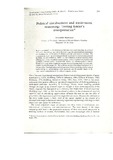| dc.contributor.author | Markoulis, Diomedes | |
| dc.date.accessioned | 2018-02-12T09:50:38Z | |
| dc.date.available | 2018-02-12T09:50:38Z | |
| dc.date.issued | 1989 | |
| dc.identifier.issn | 0144-6665 | |
| dc.identifier.uri | http://hdl.handle.net/11728/10479 | |
| dc.description.abstract | n previous research on the relationships between socio-moral reasoning and political orientation, the evolving capacities in the moral-cognitive realm have been considered as the framework for the formation of different political orientations or attitudes. The purpose of this study was to investigate whether an alternative interpretation proposed by Emler, Renwick & Malone, (1983), i.e. that differences in moral reasoning reflect differences in content of politico-moral ideology, could be verified with students and university graduates actively involved with politics, in a different political culture. Seventy-five young adults completed a measure of moral reasoning from their own and a contrasting political perspective. The results are interpreted as supporting Emler et al.'s interpretation. The implications and the limitations of the study are discussed in terms of understanding vs. discriminating moral arguments and the possible impact of the experimental manipulations of the subject's response pattern. | en_UK |
| dc.language.iso | en_US | en_UK |
| dc.publisher | Wiley | en_UK |
| dc.relation.ispartofseries | British Journal of Social Psychology;1989, vol. 28, pp. 203-212 | |
| dc.rights | © The British Psychological Society | en_UK |
| dc.rights.uri | http://creativecommons.org/licenses/by-nc-nd/4.0/ | en_UK |
| dc.subject | Research Subject Categories::SOCIAL SCIENCES::Social sciences::Psychology | en_UK |
| dc.subject | sociomoral reasoning | en_UK |
| dc.subject | Emler's interpretation | en_UK |
| dc.title | Political involvement and socio-moral reasoning: testing Emler's interpretation | en_UK |
| dc.type | Article | en_UK |
| dc.doi | 10.1111/j.2044-8309.1989.tb00862.x | en_UK |


